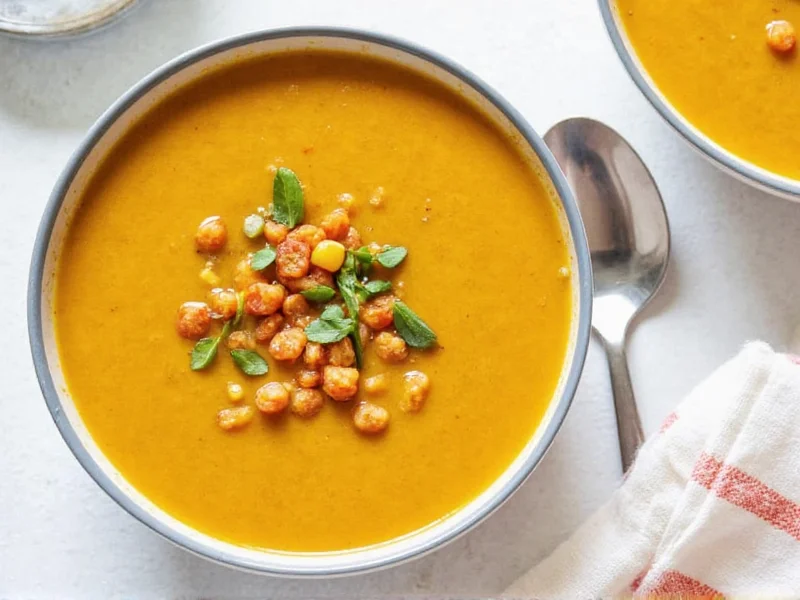Creating delicious soups doesn't require culinary expertise or hours of preparation. With the right approach, you can make satisfying, homemade soup using ingredients you likely already have in your kitchen. The key to effortless soup making lies in understanding fundamental techniques and having a repertoire of simple recipes that adapt to your available ingredients.
Why Simple Soup Recipes Work for Busy Cooks
Easy soup recipes solve common cooking challenges: they're forgiving for beginners, adaptable to dietary needs, and perfect for using up leftover ingredients. Unlike complex dishes, soups improve with minimal attention—simmering while you handle other tasks. Nutritionists confirm that homemade soups typically contain 30% less sodium than canned alternatives while providing hydration and essential nutrients.
Essential Pantry Staples for Effortless Soup Making
Before diving into specific recipes, stock these basics for quick soup recipes for beginners:
- Low-sodium vegetable or chicken broth (canned or boxed)
- Canned tomatoes (diced, crushed, or fire-roasted)
- Dried herbs (thyme, oregano, bay leaves)
- Garlic and onions (fresh or frozen)
- Canned beans (white beans, chickpeas, black beans)
- Pasta or rice (small shapes work best)
- Olive oil and vinegar
7 Foolproof Easy Soup Recipes
These simple soup recipes with pantry ingredients require no specialty equipment and minimal active cooking time. Each serves 4 and can be prepared in 30 minutes or less.
| Soup Name | Prep Time | Key Ingredients | Dietary Notes |
|---|---|---|---|
| 3-Ingredient Tomato Basil | 10 min | Canned tomatoes, fresh basil, broth | Vegan, gluten-free |
| White Bean & Garlic | 12 min | Cannellini beans, garlic, lemon | Vegan, gluten-free |
| Chicken Noodle Express | 15 min | Rotisserie chicken, egg noodles, carrots | Gluten-free option |
| Black Bean & Corn | 8 min | Canned black beans, corn, cumin | Vegan, gluten-free |
| Minestrone Light | 12 min | Zucchini, canned beans, pasta | Vegan option |
| Creamy Potato Leek | 20 min | Potatoes, leeks, broth | Vegan option, gluten-free |
| Miso Soup Upgrade | 5 min | Miso paste, tofu, seaweed | Vegan, gluten-free |
Detailed Recipe: 3-Ingredient Tomato Basil Soup
This easy weeknight soup meal demonstrates how minimal ingredients can create maximum flavor.
Ingredients
- 2 (28-ounce) cans crushed tomatoes
- 4 cups vegetable broth
- 1 cup fresh basil, chopped
- Salt and pepper to taste
Instructions
- In a large pot, combine tomatoes and broth over medium heat
- Bring to a gentle simmer (do not boil vigorously)
- Add basil and simmer for 15 minutes
- Season with salt and pepper
- For creamier texture, blend half the soup with an immersion blender
Pro tip: This quick soup recipe for beginners becomes restaurant-quality with just two additions: a Parmesan rind added during simmering and a drizzle of good olive oil before serving.
Customization Strategies for Pantry Soup Success
The beauty of easy homemade soup recipes lies in their adaptability. Follow this formula when improvising:
- Base: Choose broth, canned tomatoes, or coconut milk
- Protein: Add beans, lentils, shredded chicken, or tofu
- Veggies: Toss in frozen or fresh vegetables (carrots, spinach, zucchini)
- Flavor boost: Finish with acid (lemon juice, vinegar) and fresh herbs
Registered dietitians recommend adding leafy greens during the last 5 minutes of cooking to preserve nutrients. For creamier textures without dairy, blend cooked cauliflower or white beans into your soup.
Avoiding Common Soup-Making Mistakes
Even simple soup recipes can go wrong without these precautions:
- Overcooking pasta: Add small pasta shapes during the last 8-10 minutes of cooking
- Salty broth: Start with low-sodium broth and season at the end
- Bland flavor: Sauté aromatics (onion, garlic) before adding liquids
- Broken emulsions: When adding dairy, temper with hot soup first
Storage and Reheating Guidelines
Most easy soup recipes for beginners taste better the next day as flavors meld. Follow these storage recommendations:
- Cool completely before refrigerating (within 2 hours of cooking)
- Store in airtight containers for up to 4 days
- Freeze in portion-sized containers for up to 3 months
- Reheat gently on stove (not microwave) to preserve texture
- Add fresh herbs and a splash of acid after reheating
Seasonal Soup Adaptations
Adjust your easy weeknight soup meals throughout the year:
- Spring: Add asparagus tips and fresh peas
- Summer: Stir in cherry tomatoes and basil
- Fall: Incorporate roasted squash and apple cider
- Winter: Add root vegetables and warming spices
Frequently Asked Questions
What's the absolute easiest soup for complete beginners?
The easiest soup for beginners is a 3-ingredient tomato basil soup using canned tomatoes, vegetable broth, and fresh basil. Simply combine ingredients in a pot, simmer for 15 minutes, and season to taste. No chopping or advanced techniques required.
How can I make soup without fresh vegetables?
You can make delicious soup using only pantry staples: canned tomatoes, beans, broth, and frozen vegetables. Many easy soup recipes work perfectly with frozen spinach, corn, or mixed vegetables added directly to the simmering liquid without thawing.
What's the minimum equipment needed for easy soup making?
The minimum equipment for easy soup recipes is a single large pot (3-4 quart capacity), a wooden spoon, and a can opener. An immersion blender is helpful but not essential for creamy textures. No specialty equipment is required for most beginner-friendly soup recipes.
How do I fix soup that's too salty?
If your soup is too salty, add an uncooked potato chunk to absorb excess salt, or dilute with unsalted broth. Adding acid (lemon juice or vinegar) can also balance salty flavors. For future batches, always start with low-sodium broth and season at the end of cooking.











 浙公网安备
33010002000092号
浙公网安备
33010002000092号 浙B2-20120091-4
浙B2-20120091-4